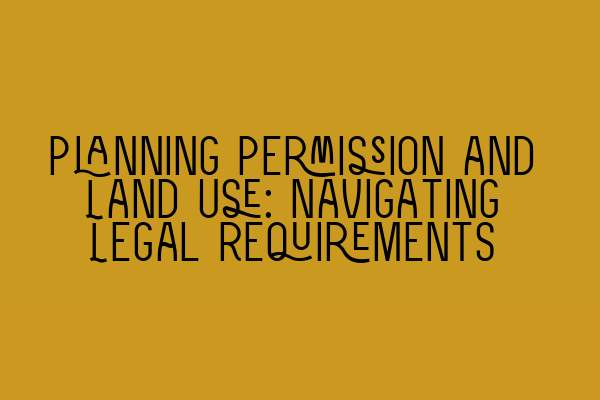Planning Permission and Land Use: Navigating Legal Requirements
Welcome to SQE Property Law & Land Law, where we are dedicated to providing expert legal advice and assistance in all matters related to property and land law. In this blog post, we will explore the intricate world of planning permission and land use, discussing the legal requirements that must be navigated when undertaking any construction or land development projects.
The Importance of Planning Permission
Planning permission is a crucial aspect of any construction or development project. It is the legal approval required from the local planning authorities to ensure that your plans align with the local development plan, national planning policies, and any other relevant regulations. Without obtaining planning permission, you may face severe legal consequences such as fines, demolition orders, or even imprisonment.
However, navigating the complex realm of planning permission can be challenging. The rules and regulations surrounding planning can vary depending on the location and nature of the development. It is vital to seek professional legal advice early in the planning process to ensure compliance and avoid unnecessary obstacles down the line.
The Planning Application Process
The planning application process involves several stages and can be quite detailed. Understanding these stages is essential to ensure a smooth and successful application. Here are the key steps involved:
- Pre-application: Before submitting a planning application, it is advisable to engage in pre-application discussions with the local planning authority. This allows you to seek their advice and obtain feedback on your proposed development.
- Application submission: Once you have finalized your plans and addressed any issues raised during the pre-application stage, you can formally submit your planning application. This typically requires completing the necessary application forms, providing supporting documentation, and paying the relevant fees.
- Public consultation: In most cases, the planning authority will undertake a public consultation to gather feedback from local residents, businesses, and other stakeholders. This allows them to consider any potential impacts your development may have on the surrounding community.
- Decision-making: Based on the information provided in your application and the feedback received during the consultation period, the planning authority will make a decision regarding your planning permission. This decision is usually communicated in writing and will outline whether your application has been approved, rejected, or needs certain modifications.
- Appeals process: If your planning application is rejected or if you disagree with the conditions imposed by the planning authority, you have the right to appeal the decision. An appeals process exists to review and reassess the application to ensure fair and impartial consideration.
It is important to note that the planning application process can be time-consuming and may require expert legal assistance to navigate effectively. Our team at SQE Property Law & Land Law has a wealth of experience in handling planning applications and can assist you every step of the way.
Land Use and Development Control
Land use and development control form an integral part of planning permission. These regulations ensure that the intended use and development of land are in harmony with the surrounding environment and adhere to the overall planning objectives of the local authority.
When embarking on a development project, it is crucial to determine the applicable land use policies and any restrictions that may be in place. Some key considerations include:
- Zoning regulations: Areas of land are often designated for specific purposes such as residential, commercial, or industrial use. Understanding the zoning regulations will help determine whether your proposed development is permissible in a particular location.
- Protected areas: Certain areas of land may be subject to special protection due to their ecological, historical, or cultural importance. These protected areas may have additional restrictions or conservation measures that must be considered during the planning process.
- Building regulations: In addition to obtaining planning permission, you must also comply with building regulations. These regulations ensure that your development meets minimum standards of safety, accessibility, and energy efficiency.
By working closely with our legal experts at SQE Property Law & Land Law, you can ensure that your development plans align with the applicable land use regulations and avoid any complications that may arise from non-compliance.
Conclusion
Planning permission and land use regulations are highly complex and can significantly impact the success of your development projects. Navigating these legal requirements with precision and expertise is essential to avoid potential legal pitfalls and ensure a smooth and streamlined process.
At SQE Property Law & Land Law, we specialize in providing comprehensive legal advice and assistance for all your property and land-related needs. Whether you require assistance with planning applications, land use assessments, or appeals, our team of solicitors is here to guide you every step of the way.
For more information about our services or to schedule a consultation, please click here to visit our website. We also offer SQE 1 and SQE 2 preparation courses for aspiring solicitors.
Stay informed and up-to-date with the latest SRA SQE exam dates by visiting this page.
Thank you for reading, and we look forward to assisting you with your property and land law matters.
